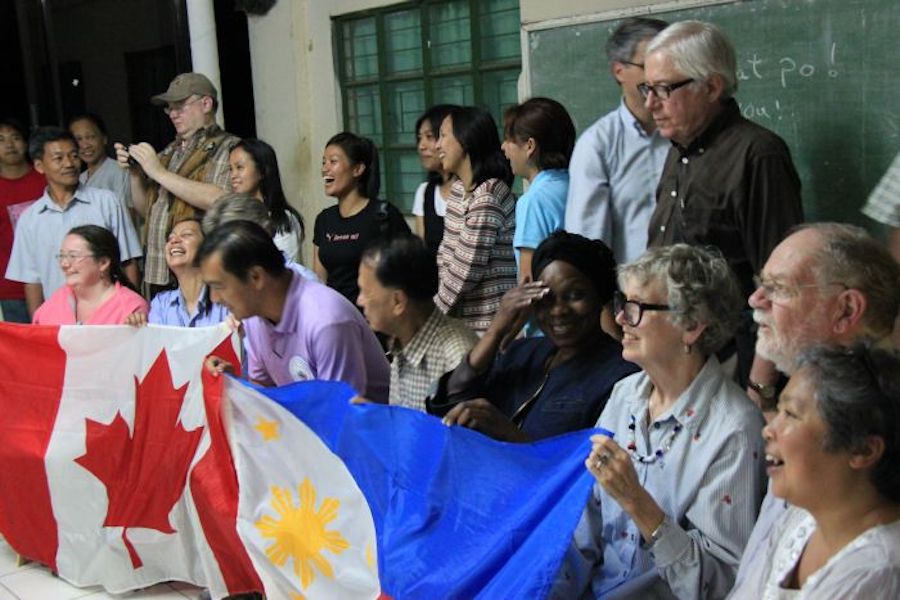The team was deeply disturbed by its findings.
It’s January 2012 and in the mountainous region of the Cordilleras in Northern Philippines, Indigenous peoples are plagued by skin disease and their ancestral lands are sinking. Houses and schools are getting swallowed up and causing fatal landslides. Fish kills are rampant. Protestors are forced to disappear or are murdered – one of whom was mutilated, his body thrown into a large river poisoned by hazardous mining waste.
Rev. Shaun Fryday organized and led the Beaconsfield Initiative, a mission trip involving 14 Canadian citizens who were mostly leaders from the United Church of Canada, including the church’s former moderator the Very Rev. Bill Phipps. For almost two weeks, they traversed lengthy rural trails, speaking to Indigenous peoples, activists, public officials and religious leaders to understand how Canadian mining interests damaged lives. Some walked mountainous paths for 12 hours to meet them and tell their stories.
Though activists and human rights groups have been calling attention to the harms of mining for years, Canada’s mining industry persistently fuels the region’s economic and social degradation. The team learned of paramilitaries protecting corporate interests through violent and abusive tactics and large-scale mining activities harming Indigenous communities.
Twelve years since his team stepped foot on what was sometimes rocky and unpaved Philippine soil, Fryday and several of the trip’s participants remain resolute in keeping the Canadian church, government and public aware of how Canadian mining operations profit off ancestral lands, wreak havoc on farmers’ and fisherfolks’ livelihoods and help curtail democratic norms in the Cordilleras.
Fryday, who served as minister of Beaconsfield United Church in Montreal for 22 years, said Canadians don’t like to talk about the mining issue.
“It’s like sex was with the Victorians,” he added, a “dirty little secret.”
One out of four mining operations in the world is linked to a Canadian entity. In 2021, Canada’s mining and exploration companies – 1,400 and counting – were valued at $285 billion. Mining Watch, which works with Indigenous groups affected by Canadian mining operations has accused the Canadian government of supporting these companies despite their involvement in human rights violations including rape and slave labor.
“We acknowledge we have gotten only a small part of the picture,” said Beth Dollaga, a Filipino-Canadian teacher who was part of the church’s Justice, Global and Ecumenical Relations Unit when she joined the trip. “But we’re confident from our documentation of the impact of mining. It was our obligation to bring back to Canada the findings of our mission.”
More on Broadview:
- Canada’s military emissions are standing in the way of its climate change commitments
- More young girls are fearing for their safety as they engage in activism
- Saleemul Huq on why the new ‘loss and damage’ fund for climate change victims must start now
The team identified at least six Canadian companies operating in the ancestral lands of Indigenous peoples in at least two provinces in 2012. Dollaga says she believes they’re still actively operating. Mining entities are difficult to track because they change their corporate identities constantly.
Aside from appearing in parliamentary committees, attending people’s tribunals and speaking at human rights conferences, Beaconsfield collaborated with progressive groups like Mining Watch, International Coalition for Human Rights in the Philippines (ICHRP) and Centre for Philippine Concerns. They’ve had decades-long partnerships in the Philippines with organizations like the Regional Ecumenical Council in the Cordillera and the human rights group Karapatan.
“We keep building and expanding our work,” said the Rev. Patricia Lisson, a Beaconsfield participant, who serves as chair of ICHRP Canada. She said Beaconsfield was a critical piece in its establishment in 2019.
The initiative sponsored church resolutions. In 2012, the United Church’s 41st general council called for the “protection of the ancestral lands and resources from destructive large-scale mining and all projects affecting Indigenous communities.” It was unanimously approved. Retired ministers also supported calls for the church’s pension plan to divest from mining investments. It was not implemented because the pension board makes final decisions on divestment policies.
They brought Indigenous leaders from the Cordillera Peoples Alliance to Canada to speak about their struggles with church leaders and human rights partners. In May 2018, they worked with the United Theological College in Montreal to bestow an honorary degree to Father Rex RB Reyes, Jr., an Anglican priest born in the Cordilleras who has advocated for his people’s concerns around the world.

In 2020, Lisson initiated a petition to the House of Commons implicating OceanaGold, a Canadian-Australian company, in forced dispersals and illegal arrests of Indigenous Ifugao residents who opposed the renewal of the company’s mining permit in Nueva Vizcaya, near the Cordillera mountains.
It was the “lure of Igorot gold,” that first drew Spanish invaders to the region during the colonial regime, according to the Philippines’ commission for culture and the arts. Igorot is the collective name of Indigenous peoples in the Cordilleras. In 1936, the Lepanto Consolidated Mining Company began operations in the Cordillera town of Mankayan in Benguet. The firm allegedly has ties with the Vancouver-based Ivanhoe Mines Ltd.
Maricar Delfin, program coordinator of the Regional Ecumenical Council in the Cordillera, brought the team to Mankayan 12 years ago, where they saw tailings (mining waste) flowing into the Abra River which snakes through the region’s provinces. She says the lands of the Kankanaey people, Indigenous to Mankayan, had become a sinking ground. “It’s now a hazard, but they remain in the area because they have nowhere to go,” she said.
There are similar stories all over the region, of lands laid waste, even weaponized against its inhabitants whose claim to it predates millennia. In a September 2023 report by the environmental group Global Witness, the Philippines is consistently ranked as the worst place in Asia for land and environmental defenders. Since 2012, 281 have been killed – a third of whom were speaking out against the mining industry.

Delfin said there have been fewer extrajudicial killings, but red-tagging has been prevalent against Indigenous people and activists who herald their cause, especially during the administration of President Rodrigo Duterte. Red-tagging labels individuals as communists, which is essentially an enemy of the state. It’s practically a “death sentence,” said Dollaga.
Delfin remains in touch with Fryday and Lisson, grateful that the Beaconsfield Initiative internationalized the campaign for human rights in her home.
The two ministers are now retired from the church but their mission continues. “We’re not there because we have a thing for mining companies,” Lisson said. “What does God require from us? To do justice, love kindly and walk humbly with our God.”
Beaconsfield published statements on various human rights concerns including the issue of extrajudicial killings, red-tagging and stifling press freedom through ICHRP Canada. Lisson co-wrote a comprehensive report about the government’s controversial anti-terrorism operations which was submitted to the United Nations. One of the operations targeted several of their Indigenous partners – one of whom received a “shoot to kill order,” after being falsely accused of murder.
Lisson says Beaconsfield is ready to lend a voice at the threat of injustice. “That’s why we’re there…that’s what this is all about.”
***
Caleb Galaraga is a Filipino freelance writer and religion reporter based in New York City.
















Please conduct it in Mindanao too where it is more prevalent. Thank U